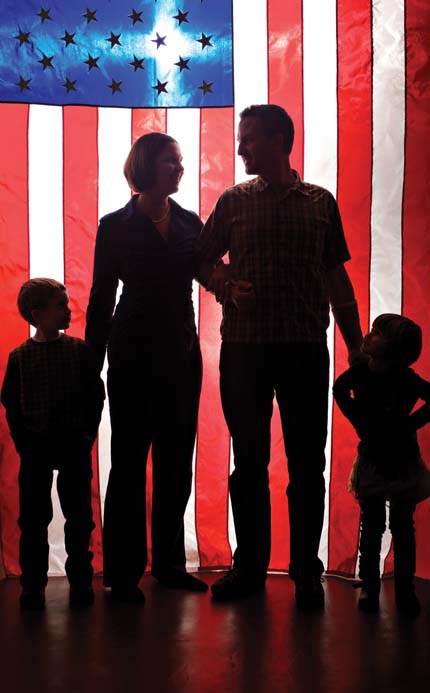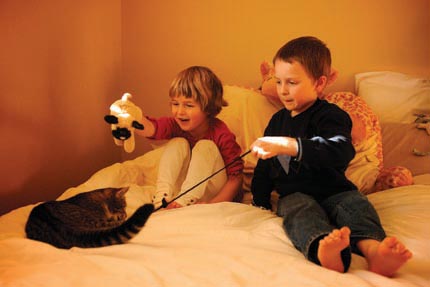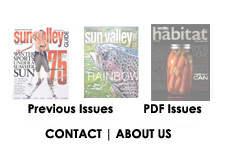Made in America
A Hailey family embarks on a year
of sacrifice and patriotism
text by Katherine Wutz photos by Dev Khalsa
A bowl of bananas sits on the kitchen table in a bright and airy household. Last year, the common fruit was a strange sight in this Hailey home, because for all 12 months of 2011 the McCarver family bought only American-made items.
"We didn't buy a banana all year," said Aaron McCarver, a local police officer and the reason for the family's change in consumer habits. "That was huge for us. We eat a lot of bananas, but we didn't for the entire year." Bananas weren't the only thing the McCarvers did without.
It was late in September 2010, while Aaron was reading the list of foreclosures in the Idaho Mountain Express newspaper, that he began to think about how he could make a difference in the American economy. At that time, unemployment was more than 10 percent and debate over the amount of debt the U.S. owed to China was beginning to heat up.
"Why is China doing so well?" Aaron asked himself. "Because we're buying all of their stuff. If we spent more on consumer goods produced here, we could, in theory, help create jobs here." With that thought in mind, Aaron started a blog, buyamericanfo
roneyear.com, and began his quest to buy only products made in the United States for one year.
He wasn't alone; his wife, Becky, a nutritional counselor at St. Luke's Wood River hospital, agreed to the scheme and helped set rules for the goods they would purchase throughout the year. "From the get-go, we had a used-item clause," Aaron said, which was crucial for buying clothes for their two young children, Abigail and Harrison. "We figured it's already been produced overseas, but if we buy it from another American, the money stays here."
Financial investments also didn't count, Aaron said, because they are not financial experts and simply couldn't go through the process of transferring all of their global investments to American-only ones.
Shopping for anything during the first few months was incredibly time-consuming. "Initially, it was a lot of work, going through the grocery store and reading every single label," Aaron said. "We spent a lot of time at first just figuring it out, what we couldn't buy or could buy."
The struggle became more difficult as the months went by. Even though the family grew used to buying brands they knew were American—Western Family from Atkinsons' and Wild Harvest at Albertsons being two—struggles with food, alcoholic beverages and recreational equipment persisted. One example was when Becky tried to make artichoke dip for a party. "You can't find any canned or bottled artichokes from the U.S., so I had to prepare and cook all the artichokes," she said. "It was the best artichoke dip I ever made, but it took an extra hour."
Aaron's stumbling block proved to be mountain bikes. An avid biker, Aaron embarked on a partial refurbishment last summer only to find out that few, if any, bike parts were available from American companies. Though he found brake pads from Oswego, Oregon, he simply couldn't find tires, tubes or cables. "We made some intentional exceptions there," he said. "I couldn't be without a bike. It just wasn't an option."
Other members of the family faced hurdles as well. Harrison, the couple's 6-year-old son, fell in love with an imported stuffed bunny at a local store, an Australian wine had accidentally been purchased and the couple was paying $25 a pound for American-grown coffee. "There was a point halfway through the year, maybe in July, where we just said, 'I think we're done,'" Becky said.
But the couple powered through, mostly due to Becky's encouragement. They learned to accept that while they may not be perfect, they were certainly more thoughtful about their purchases than they had been. "When I started this, I wanted to do it perfectly," Aaron said. "I wanted zero mistakes. So when we started making mistakes, I thought, 'If we're not going to do this right, why do it at all?'"
Even if they had succeeded in buying 100 percent of consumer goods from the United States, some economists say that the Buy American movement could harm the U.S. economy if taken to the extreme.
"The preponderance of Chinese and other imported goods on retail store shelves may give the impression that America does not make anything anymore," said Daniel Ikenson, policy studies director for the Cato Institute, a think tank dedicated to free trade (among other things), when he addressed a House subcommittee last March. "But it is beyond question that countless U.S. jobs depend on imports from China."
Ikenson cited the iPod specifically and Apple more generally as an American company that used cheap labor in China to produce a product that led to the company's employing countless American programmers, distributors, researchers and salespeople.
Aaron said he doesn't disagree with the criticisms. Shutting the country to all imports would be protectionism, he said, leading to other countries' refusing to buy American exports and tanking the U.S. economy. "If everyone in the United States did it, it would be a terrible thing," he said.
Still, the family will continue to be more thoughtful about what they buy, even though their experiment is officially over. Harrison will finally get his stuffed bunny, and Becky bought a new iPhone in January, but the McCarvers are now dedicated to thinking about what they buy. "So many of us buy garbage just because," Aaron said. "As a nation, we are not that thoughtful about what we purchase."
Even when the family made a much-anticipated shopping trip to Twin Falls on New Year's Day, Becky said they were careful to buy things they needed—and if there was a choice, they still went with the American-made product.
Though the family spent more on some American items than the overseas counterparts—coffee and maple syrup being two major staples—Becky said they did not spend as much as they thought they would, due to the cutback in overall consumer goods. "It's not just about buying the cheapest thing," Aaron said. "It's about buying the right thing."
|

Harrison, Becky, Aaron and Abigail McCarver.
Overseas
exceptions
-
The McCarvers were only able to eat avocados seasonally, and bananas not at all.
- The family used to buy their coffee from a local coffee company, but when they discovered the local roaster uses imported beans they switched to buying Kona-grown Hawaiian coffee.
When Harrison started T-ball last spring, the McCarvers bought used overseas-made gloves and baseballs for him, as it was impossible to find U.S.-made equipment. "The all-American sport doesn't exist!" Becky said.- When Becky needed a new bike helmet, the McCarvers had no choice but to buy an imported one. They did not buy any new clothes for themselves for the whole year, and only minimal clothing for the children—most of which was made in the United States, with the exception of new underwear for Abigail.

Abigail's American-made Christmas gift was a kitten from the shelter.
American-made
Delights
- The McCarvers switched to buying Vermont maple syrup, California olive oil and Florida orange juice. Aaron said the maple syrup and oil were better quality than they had been purchasing and the juice switch had unexpected benefits during the scare over fungicide in imported orange juice.
- They bought gas only from Sinclair Oil gas stations. Though Sinclair uses crude oil from Canada and the United States, all gas is refined in this country
- Aaron's new running shoes came from New Balance, the only major athletic shoe brand made in the United States.
- Typically the family makes donations to local charities as gifts for friends and co-workers, but Christmas was more difficult when it came to their own children. They didn't buy any electronics or toys from overseas; instead, Abigail received a cat from the Wood River Animal Shelter, while Harrison got a globe manufactured
in Chicago.
|


